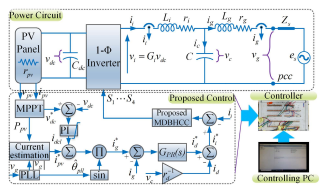Faster Convergence Controller with Distorted Grid Conditions for Photovoltaic Grid Following Inverter System
Also Available Domains Power Quality
Objective
The main objective of this project is to improve power quality and achieve zero steady state error by using MDBHCC with PR controller.
Abstract
In this project, the hysteresis current controller (HCC) for grid following inverter (GFI) system with LCL-filter is a well-known controller for its robustness, fast reference tracking, better dynamics, and easier implementation compared to other controllers. However, HCC behaves differently while integrating such a system with solar photovoltaics (PV). The PV-based GFI system requires fast convergence while transferring maximum power from PV to the grid at minimum converter losses through GFI. This paper therefore proposes a modified double-band HCC (MDBHCC) with proportional resonant (PR) controller for single-phase PV integrated GFI system with LCL-filter. The proposed algorithm implements a unipolar symmetrical PWM strategy for reducing inverter switching losses through a sequential logic with an adaptive clock. It improves the variation in switching frequency and limits the maximum switching frequency of HCC while enhancing the total harmonic distortion (THD) of the injected current into the grid at the point of common coupling. To alleviate the power quality problem and achieve zero steady state error, the proposed MDBHCC with PR control operates at lesser % THD. The simulation results of this method can be evaluated by using Matlab/Simulink Software.
Keywords: GFI, hysteresis current control, LCL filter, power quality improvement, total harmonic distortion
NOTE: Without the concern of our team, please don't submit to the college. This Abstract varies based on student requirements.
Block Diagram

Specifications
Software Configuration:
Operating System : Windows 7/8/10
Application Software : Matlab/Simulink
Hardware Configuration:
RAM : 8 GB
Processor : I3 / I5(Mostly prefer)
Learning Outcomes
- Introduction to Matlab/Simulink
- What is EISPACK & LINPACK
- How to start with MATLAB
- About Matlab language
- About tools & libraries
- Application of Matlab/Simulink
- About Matlab desktop
- Features of Matlab/Simulink
- Basics on Matlab/Simulink
- Introduction to controllers.
- Study of PWM techniques.
- Project Development Skills:
- Problem analyzing skills
- Problem solving skills
- Creativity and imaginary skills
- Programming skills
- Deployment
- Testing skills
- Debugging skills
- Project presentation skills
- Thesis writing skills


 Paper Publishing
Paper Publishing
